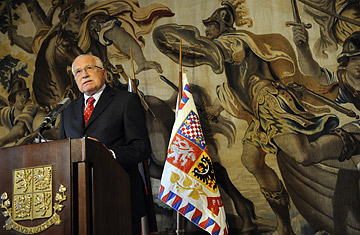
Czech President Vaclav Klaus reads a statement at the Prague Castle.
Václav Klaus doesn't hide his scorn of the European Union. The irascible Czech President refuses to fly the E.U. flag over Prague Castle. He argues that climate change — targeted in one of the E.U.'s signature policies — is a myth. On his only visit to the European Parliament, in February, he bluntly compared the E.U. to the Soviet Union. So it is no surprise that the 68-year-old former economist should try to sink the Lisbon Treaty, which aims to overhaul the E.U.'s decision-making process and has been a decade in the making.
With Ireland and Poland having signed on to the Treaty in the past month, the Czech Republic remains the only member still to ratify it. Last week, Klaus said he would not sign the document until it was rewritten. "I fear, and I am not the only person to fear, a deepening of E.U. integration," he said during a visit to Moscow on Oct. 14 to promote Blue Planet in Green Shackles, his climate change denial tome.
Klaus claims his resistance is in defense of ideals like freedom and democracy, but his treaty demands — including one that relates to a long buried dispute that goes back to World War II — are bewildering, say E.U. officials. While in exile between 1940 and 1945, the Czechoslovak government led by Edvard Bene ordered that all German speakers in the Sudentland region of Czechoslovakia should be deported and their property seized. Klaus now claims that the E.U. Charter of Fundamental Rights, which is incorporated in the Lisbon Treaty, might become the basis for property restitution lawsuits by descendants of those German-speakers. He says he wants a clause in the treaty guaranteeing that the Bene Decrees will never be invalidated.
The E.U., though, has no power over issues of private property. Furthermore, the Charter of Fundamental Rights cannot be applied retrospectively. Klaus, says British Liberal Democrat MEP Andrew Duff, is merely posturing. "His demand is utterly spurious," says Duff, who helped draft the Lisbon Treaty. "If he had been truly concerned about the Bene Decrees, he would have raised it much earlier." Duff says that by bringing World War II into a current debate, Klaus has overstepped a mark and forfeited his credibility. "It is not honorable or civilized for a chief of state. And it sends a signal to other nationalists and populists that it can be done," he says.
Because both houses of the Czech parliament have endorsed the treaty, Klaus is constitutionally bound to sign it. But he could delay that until his last day in office, four years from now. In theory, the president could face impeachment for refusing to sign. But both Klaus and his Bene complaint have broad popular backing, and the country's technocratic government is trying to negotiate a settlement with the other E.U. member states.
Across the E.U., officials are split on how to handle Klaus. Last week, European Commission President José Manuel Barroso called on Klaus not to raise "artificial obstacles" to the treaty, adding that since he had been elected president by the Czech parliament, he should "respect its views." Some talk darkly of punishing the Czech Republic, for example, by denying the country a seat in the next European Commission. French President Nicolas Sarkozy has warned of "consequences" if Klaus does not sign. But this could make a martyr of Klaus and stiffen his resolve. Others say the Lisbon Treaty is too important to be jeopardized, and the protocols should be agreed on quickly and quietly as long as Klaus promises he will sign immediately.
It's E.U. officials who are most worried about time, not Klaus. The likely next British Prime Minister, the Conservative Party's David Cameron, says he will hold a referendum on the treaty if it is not ratified by all 27 E.U. member states before the next U.K. elections, due by June 2010. "Klaus is just looking for another pretext to let the ratification linger until British elections," says Sara Pini, who heads the Brussels office of the Robert Schuman Foundation think tank. "No one can compel him to sign, but the E.U. could give him a reason to. This could be a stick, like threatening to deprive the Czech Republic of its commissioner, or a carrot of a prestigious commission post." But even that is no guarantee. Whether showered with threats or treats, Klaus may still prefer to be Europe's pariah.
